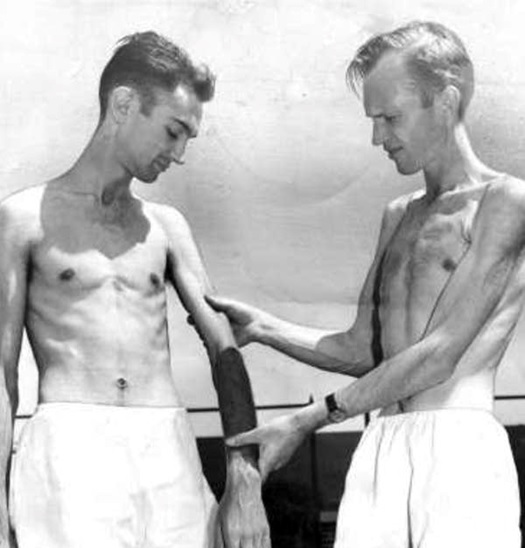
Have you heard of the Minnesota Starvation Experiment? It was a landmark study that looked at the effects of calorie restriction on the human body. Researchers took 36 healthy men and put them on an extremely low calorie diet for a period of six months to see how it would impact their physical and mental health. Despite taking place many decades ago, this study gathered fascinating data that is still useful today. Read below to learn what was involved and how the men coped eating only 1500 calories per day.
Reason For The Study
This experiment, led by Ancel Keys and associates at the University of Minnesota, took place in 1944. World War Two was still going on and many were malnourished as a result of food rations. At the time, there was very limited research available on how famines affect the human body. This was the impetus for the Minnesota Starvation Experiment. The researchers wanted to understand the long term impact that the war rations would have on the population and how to best rehabilitate those who had been starving.
What Did The Experiment Entail?
36 healthy young males volunteered to take part in this experiment however they might have thought twice if they knew in advance how the starvation period was going to impact them psychologically. The study was divided up into three parts. A three month initial observation period, followed by a six month starvation diet and then a three month recovery period. The first stage entailed them eating normally whilst being observed. This was so the experimenters could see what a day of eating for the men would typically look like. After that came the starvation period. The men were fed around 1500 calories which was half of what they were used to consuming per day. Their starvation diet included slices of bread, potatoes and limited amounts of lean meat and dairy. These items were selected because they were the options available during the war in places where food rationing took place. Over time, the men were fed less and less food so the researchers could analyse the impact of a calorie deficit on their health.
How Did They Cope With Starvation?
During the starvation period, the researchers monitored the men’s physical and mental health. To say they experienced negative effects would be an understatement. After a few weeks of being on a low calorie diet, the men became extremely irritable and preoccupied with food. They struggled to concentrate on everyday tasks and even began collecting cookbooks and recipes to satisfy their food obsession. It was obvious their mental capabilities were diminished and their energy levels became non-existent. They withdrew socially and some even engaged in self-mutilation. One guy cut off three of his own fingers however it isn’t clear whether this was on purpose or accidental. Physically, they all lost significant amounts of body fat and strength. Their heart rates slowed down and so did their baseline body temperature. As you can see in the photos, the men looked severely malnourished (because they were). Although the researchers did expect to see changes, it was surprising how much of a toll the diet took, especially on the men’s personalities.
Post Starvation Diet
After the starvation diet came the rehabilitation period. The men were separated into four groups and each fed a different amount so that the researchers could find out the best way to recover from famine. Obviously all of the men needed to significantly increase their calorie intake. However, the researchers weren’t yet sure how much food would be too much. The men were permitted to choose their own meals however it became immediately obvious that their eating behaviours were vastly different to what they were before. They struggled to identify hunger signals and many ate well past the point of feeling full. This led to a lot of gastrointestinal upset and headaches. Participants reported feeling much hungrier than before and even developed body image issues. Although their physical health returned as they ate more calories, their mental health was heavily impacted for a long time afterwards. They all recovered eventually but some took up to two years before they felt normal again. Interestingly, all but one of the men said they would participate in the study again if given the chance.
What We Can Learn From This
This landmark study shaped our modern understanding of caloric restriction. Not only did it inform scientists on how best to rehabilitate people after famine, it highlighted the link between mental health and nutrition. This experiment spurred important eating disorder research that still gets used to this day. The food you eat seriously impacts your physical, social and mental well-being. Without adequate calories, you can expect to feel depressed, lethargic and preoccupied with food. This is why so many of us struggle to stay on a low calorie diet for long periods of time. The human body needs fuel to function. Shedding a bit of body fat might seem like a reasonable goal but don’t go so far into a deficit that it impacts your quality of life. When it comes to calories, less does not equal better.
Conclusion
The Minnesota Starvation Experiment left an enduring legacy. It still gets taught in universities to this day and has informed a plethora of nutrition research. This study would likely not receive ethics approval nowadays because we know how harmful starvation is to both physical and mental health. Let this be a reminder how vital good nutrition is to your wellbeing. If you do want to lose weight, a large calorie deficit is not a great idea. Focus on small changes that are sustainable in the long run. You can’t live a full life on an empty stomach.
Written by Lauren Carruthers
